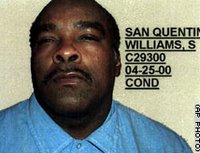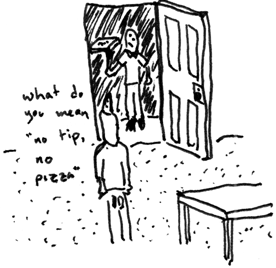Today you have a special treat -- a guest entry from Mark:
When we first arrived in America, I decided that I would not cling to all things English. I was expecting to miss The Guardian, Radio 4, FiveLive, BBC1, BBC2 and Channel 4, the politics, the football, the cricket, but I thought I’d be able to cope. We were coming to live in America, and I wanted to enjoy America for America, to learn to live with and to love the best of its media and its culture. I did not expect that to be difficult because I have always so enjoyed visiting the USA in the past. When I hire a car, I want to get American radio on. When in a hotel room, I am keen to get American television on. Viola and I have always enjoyed the best of American film and TV too, so we were looking forward to catching all the best films as they came out, and seeing the new television months before it comes out in Britain.
For the first three weeks or so, I found it pretty easy to cope. We’d put American TV on each morning in our hotel room, we listened to American radio in the car and there was too much to think about to miss all things English (and you don’t miss good tea, black pudding, toast and marmalade so much when you’re learning to love root beer, jerky and hush puppies). But as the weeks went on, I surprised myself by just how much I began to miss home, and I have had to learn the secret of how to survive as an English person in America. Just in case there are others out there in the same predicament, or others considering the move, here’s how I have managed.
I had never realized how fond of Radio 4 I was until I hadn’t got it any more. Waking up in the morning means the Today programme. Friday evening means Any Questions? Saturday mornings mean The Week at Westminster. Sunday night means The Westminster Hour. When do you laugh as much as when you listen to I’m Sorry I Haven’t a Clue? I am not a gardener, but I always listen to Gardeners’ Question Time. It rarely speaks to my situation, but Money Box is a staple. If you leave the UK and you’re a Radio 4 devotee, you will really miss it. But the good news here is that it is perhaps the easiest problem to solve. Everything is available on-line, not only to listen live, but also archived.
Of course, you’ll need a computer for this, but then you probably have one of those if you are reading this. Ideally you need some decent speakers too, and ideally a good broadband wireless connection and a laptop. With the laptop, you can take the radio around with you. If your laptop is like mine, you can close the lid and carry on listening. And if it seems like a right business going to the web and finding the link each time, just add a button bookmark for Radio 4 and Radio 4 live at the top of your Firefox browser.
I do the same for Five Live and of course one could do it for any other channels one listens to regularly. One problem with Five Live, however, is that many of its sporting events, including all the football, are unavailable on-line. And, alas, the thing I have really missed recently is Test Match Special. The BBC did not have the rights to broadcast the recent England v. Pakistan series abroad. I am hoping that that will change in the summer.

Si-Link FM Transmitter
Speaking of
Five Live, the audio feed tends to be that bit weaker than for
Radio 4, and this raises the general issue of listening on the laptop: sometimes it’s just not loud enough. But a couple of weeks ago I found a great little gizmo for $15 (reduced from $30) which you can plug into the ear-phone socket of your laptop and it broadcasts a local signal for you to pick up on your radio. This was a revelation. You have to place the laptop pretty near to your radio, and you have to do a little tweaking, but once you are used to it, it is a great way of getting the radio feed from your laptop loud and clear. It’s called a
Si-Link FM Transmitter and is a great investment.
Television, though, is a bigger problem. When my brother Jonathan came over to see us a couple of weeks ago, he brought with him a video of some of the highlights of British TV since September, and it was fabulous. It’s strange how even the sound of the links between programmes can make you just a little homesick. Outside of treats like that, though, what does one do? There are several things worth mentioning. The first is
BBC America, which comes in most cheap cable and satellite packages. (We have Time Warner Cable, but will be changing in due course to Dish Network – see below). I had my hopes a bit too high when we first got this, imagining that it would give one the best of current BBC television. What it actually gives is endless repeats of Monty Python and Benny Hill, and a few other bits and bobs of interest, but stuff that is usually already some months old. We enjoyed catching
Viva Blackpool, which we had missed when it was on in the UK; and it featured new
Dr Who David Tenant. But you won’t get the latest series of Little Britain, at least not for some months, or Newsnight.
There is some TV that you can catch on the internet for free, albeit via a shaky realvideo link. The two that I watch, usually on the archive rather than live, are
Question Time and the new Andrew Marr programme
Sunday AM. I learned of the latter, which started after we had left the UK, because of a pastiche it has in its opening credits of the cult 60s TV series The Prisoner. I dare say that there are other BBC programmes one could watch on-line, but I don’t know of a list anywhere, and those are the only two I have found so far.
So it’s straightforward to get your fill of British politics, and you can top that up, of course, by reading
The Guardian Unlimited. But what about sport? I’ve already mentioned
Five Live, but there is good news on the TV front. If you are a football fan, there’s a whole channel devoted to it even on the basic cable packages. It’s called
Fox Soccer Channel and broadcasts a lot of live premiership football. One of my staples has become the 5 pm GMT (12 pm ET here) live match every Saturday. In fact, I am now watching more premiership football on American TV than I was on UK TV, because you have to subscribe specially to Sky TV for the live Premiership stuff in the UK. Fox Soccer Channel gives you the Sky commentary, but overlays it with an American introduction, which always refers to the “EPL” (English Premier League), “soccer” and “game” (never “match”), e.g. they have a “player of the game”.
Cricket is initially more of a problem, but I think I’ve found the solution. It seems that
Dish Network has the rights to the UK test matches for the next four years or so, and the good news is that Dish is much cheaper than Time Warner Cable. It’s around $30 a month. You have to pay a premium, something like $70-$90 for the cricket for the season, but since that is now also the case in the UK too, with Sky taking the home test matches, it’s not so much of a big deal. So at some point soon we are going to be making the switch. It’s a fantastic thought that I will still be able to watch cricket in the summer. I could hardly hope for more.
Don’t get me wrong. I am enjoying building on our love of some American TV series and films by learning more of American politics and sport. I went to my first Duke basketball match on Sunday and loved it, especially the atmosphere (but where were the cheerleaders?) and NPR radio is a staple when I’m driving, and sometimes in the house too. But it’s much easier to enjoy all that America has to offer when one has access to a lot of what one misses from the UK too.
April 25, 2006
You can find an update to the parts of this post that are pertinent to football at:
How to cope without British TV and Radio: Football Supplement


















 Pecan pie is the quintessential Thanksgiving dessert. We were lucky enough to be invited to an American family's home for Thanksgiving. A couple of days before, they phoned and asked us if we'd like to bring a pudding. Our initial thoughts were of banoffee pie -- a staple of students. However, one quick google search later, we decided that "
Pecan pie is the quintessential Thanksgiving dessert. We were lucky enough to be invited to an American family's home for Thanksgiving. A couple of days before, they phoned and asked us if we'd like to bring a pudding. Our initial thoughts were of banoffee pie -- a staple of students. However, one quick google search later, we decided that "
 (
(


 How can I have a blog on Americanization without discussing Halloween? Halloween is such a big festival in the US and we just experienced it for the first time a couple of weeks ago.
How can I have a blog on Americanization without discussing Halloween? Halloween is such a big festival in the US and we just experienced it for the first time a couple of weeks ago. Perhaps I'm being too hasty in saying that the Pagans have won. In fact, many Christians resist the pull of Halloween. In the UK, may Christians just don't partake. Others actively resist by holding "alternative" celebrations for their youth clubs, to desuade them from going to the school's Halloween disco. All Saints' Day has not yet been forgotten.
Perhaps I'm being too hasty in saying that the Pagans have won. In fact, many Christians resist the pull of Halloween. In the UK, may Christians just don't partake. Others actively resist by holding "alternative" celebrations for their youth clubs, to desuade them from going to the school's Halloween disco. All Saints' Day has not yet been forgotten. Although, in the USA, the celebration of Halloween is very much tied in with the Harvest festival (eg. the use of pumpkins and scarecrows), it seems to me that in the UK it is becoming more and more tied in with Guy Fawkes. I think that this is mainly related to the proximity of the two festivals (October 31st and November 5th). Let me know what you think.
Although, in the USA, the celebration of Halloween is very much tied in with the Harvest festival (eg. the use of pumpkins and scarecrows), it seems to me that in the UK it is becoming more and more tied in with Guy Fawkes. I think that this is mainly related to the proximity of the two festivals (October 31st and November 5th). Let me know what you think.











